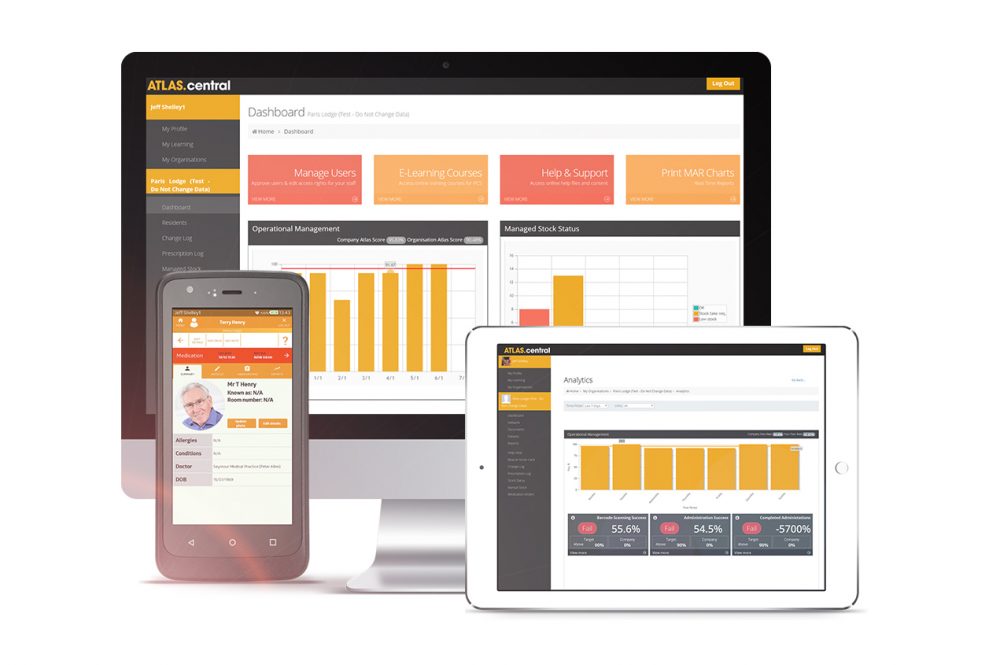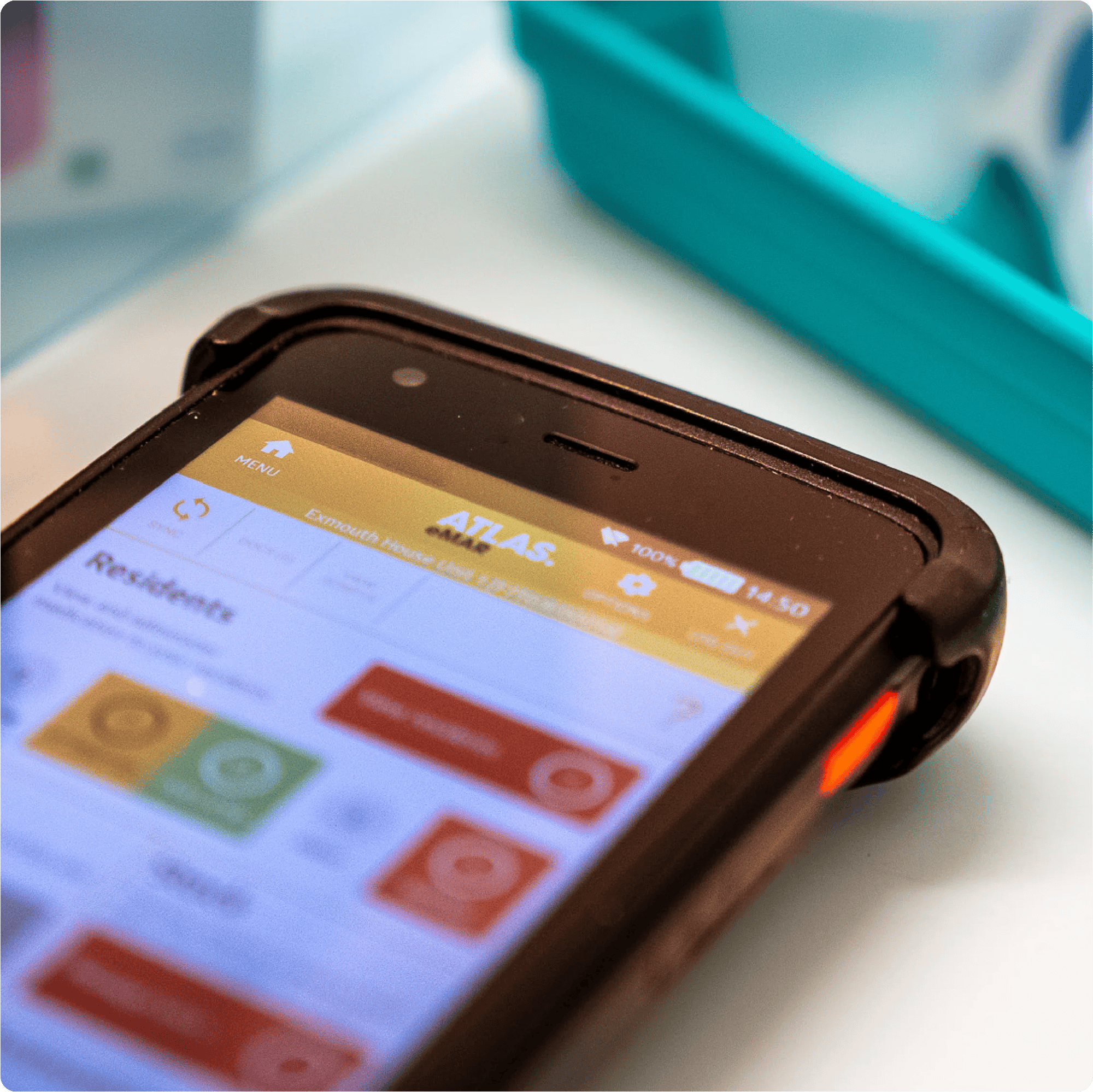How ATLAS eMAR improves medication accuracy and helps to achieve the CQC Standards for care homes
What are the CQC 5 Standards and Fundamental Standards?
When the CQC inspectors are in the process of evaluating any care home, their inspection is guided by five key areas, which are the CQC 5 Standards. The 5 Standards come in the form of questions, and from the point of view of a care home, providing good answers to these questions is the goal not just in providing person-centred care, but evidencing it. These questions are:
- Are they safe? A care home protects its residents from abuse and avoidable harm
- Are they effective? The care, treatment and support of those in care homes achieves good outcomes, helps to maintain quality of life and is based on the best available evidence
- Are they caring? Staff involve and treat residents with compassion, kindness, dignity and respect
- Are they responsive to people’s needs? Services are organised so that they meet a resident’s needs
- Are they well-led? The leadership, management and governance of the organisation make sure it’s providing high-quality care that’s based around the individual needs of residents, that it encourages learning and innovation, and that it promotes an open and fair culture.
Whereas the 5 CQC Standards are the basis on which inspections are carried out and care homes are evaluated, the CQC Fundamental Standards were set down in law as part of the Health and Social Care Act 2008, and as such they are the minimum requirement for care provision in England; they form the baseline for standards below which a care home cannot fall. The CQC Fundamental Standards are:
- Person-centred care
- Dignity and respect
- Consent
- Safety
- Safeguarding from abuse
- Food and drink
- Premises and equipment
- Complaints
- Good governance
- Staffing
- Fit and proper staff
- Duty of candour
- Display of ratings
The 5 Standards against which the CQC measure care homes when they are evaluating them are taken from the Fundamental Standards, which were developed earlier.
As a care provider, being CQC compliant is essential because it gives those being cared for peace of mind that they are getting the type of care that they require and the best quality of life will be provided; it will also reassure them that they will get not just the treatment they require but their emotional needs will also be met. It can also be very reassuring for relatives to know that their loved ones are receiving the standards of care that they would want for them.
When evaluating a care home, the CQC will provide an inspection report that goes into significant detail, and then will generate an overall rating. Ratings include; outstanding, good, requires improvement, or inadequate.
Read more here on the changes coming from CQC around the new single assessment framework
How an eMAR system can help to achieve CQC Standards in care homes
It goes without saying that every care provider will want to do their very best to provide truly person-centred care for their residents, but it can still be a daunting proposition nonetheless when inspectors are evaluating a care home and its operations.
After all, it’s one thing to strive to provide the best possible for care residents, but it’s another thing to be able to evidence it to the standards required to achieve a good or outstanding CQC rating. But in recent years there have been significant advances in technology, such as the growing popularity of eMAR systems, which give care providers the tools they need to ensure the best possible medicines management, accuracy, oversight and communication.
There are many ways that an eMAR system can be used to help achieve and evidence CQC Standards in care homes, but one of the main benefits provided is superior medication accuracy and the reduction of risk associated with medication accuracy and overall management and administration.
Everything in one place
An eMAR system is a digital platform that allows for the storage of medication records and the management of medication administration all in one place. It is a system designed to streamline the process and evidencing of medication management and one of its main functionalities is to reduce medication errors in care homes.
It can provide care home staff with:
Real-time information on medication orders
Administration schedules
What dosage might be needed, and any changes required
Safety is one of the 5 CQC Standards, as is Effective, and utilising an eMAR system allows you to meet both Standards because it enables care home staff to scan medication labels using a barcode scanning feature to ensure that the right medication is being given. In just a few seconds, it eliminates almost any possibility of human error because it provides exactly what should be administered, when it should be administered and to whom. And it will notify you of any changes to medication, ensuring that nothing gets lost in communication between staff during a hectic shift.
The system will have automatic safety checks too, which can alert of any potential issues that may compromise resident safety, such as missing doses, medication interactions, or incorrect doses. Even the most up-to-date paper MAR chart system can’t be updated to the very last second, but an eMAR system provides real-time information, ensuring that the medication needs of the residents are always updated and always provided. With this in mind, how medication management plays into Standards such as Safe, Effective, Responsive and even Staffing can be identified, met and evidenced with the help of an eMAR system.
Free guide: Improve CQC ratings and make medication management easy
ATLAS eMAR helps you go above and beyond
Person Centred Software’s ATLAS eMAR uses portable but robust handheld devices, which can be operated by care staff, that show specific medications that should be administered to the right resident at the right time. It is updated in real-time, so no matter what happens at what time of day or night, care staff can be confident that they are providing accurate and safe medication administration.
To do this, staff need only pick up a medication packet and scan the pharmacy label using ATLAS eMAR’s Barcode Technology feature to input all the data from the medication and run safety checks to flag up if there is a risk of the wrong medication, wrong dosage, or both being administered.
And if you’re thinking about how ATLAS eMAR can help you achieve other CQC Standards for care homes, you can go above and beyond to evidence good governance and examples of a care home being well-led with the help of the Centralised Dashboard feature. With Centralised Dashboard, every transaction related to medication can be logged, along with staff codes, so a full audit trail is available whenever needed.
This not only gives a care home manager oversight of everything, but this information can also be used to evidence quality and diligence of care to the CQC. Staffing standards can be addressed because not only does Centralised Dashboard give home managers the tools they need to ensure that the operations of the care home are running smoothly and to a high standard, but the reports available in the system give care home managers the information they need to identify staff training needs and areas of practice that need to be improved or addressed.
And if any care homes in a wider group operation are falling short of expected standards, it’s easy and efficient to identify who it is and why it’s happening. Centralised Dashboard can not only provide meaningful solutions to problems that may arise because of a lack of centralised governance or an overreliance on inefficient and often out-of-date paper records, but it can give care home managers the means of empowering staff to provide the best person-centred care possible in other areas because of the time savings.
There are a number of other features of ATLAS eMAR that also ensure safe, accurate and responsive medication management, such as:
Group Reporting
View care home and pharmacy data as a single health record, which greatly streamlines and improves the process of communication in terms of medication accuracy. This is especially useful for evidencing responsive and effective standards, among others.
Stock Control
Put simply, if medication stock runs out, that can pose a huge problem and risk to resident safety and wellbeing. But with the Stock Control feature, care homes can easily manage stock, optimise therapy and simplify prescription tasks.
Pharmacy Integration
This can give you dispensing processes all tailored to your requirements. By connecting pharmacies to ATLAS eMAR, care homes can be assured of a strict process for dispensing medication. Each prescription is scanned into an image that can be viewed on the Centralised Dashboard. Each item is barcode-validated to ensure it is correctly dispensed, and every label is issued with a barcode so it can be scanned and safely administered by care staff using the hand-held device.
Medication Ordering
Ensuring accurate and safe medication administration has never been easier thanks to ATLAS eMAR, but now you can be sure that you will have all the data and reports you need to easily evidence the quality of your care to match and exceed the Fundamental Standards and comply with the 5 CQC Standards.

Free up time to pursue an outstanding rating
So far, we’ve discussed how eMAR systems and more specifically ATLAS eMAR can directly help care homes to achieve CQC Standards through the use of its next generation technology. But one of the key features of an eMAR system is the time you will save by using it. Time that would otherwise have been spent dealing with outdated medication information and inefficient paper MAR charts is now free to be used in other areas.
So while an eMAR system can actively assist in the evidencing of medication management and accuracy for CQC inspectors, the holistic benefit can be manifestly felt, and the time saved put to good use to make sure the other Standards set by the CQC are being adhered to.
For example, care staff can be more responsive to the emotional needs of a resident because they won’t be spending half their shift chasing down documentation; they can take the time to sit with a resident, strike up a conversation, take part in activities and generally foster a meaningful connection to the people they care for.
The little things are often the things that make the difference when it comes to providing superior person-centred care. Ensuring that residents are cared for in a dignified, compassionate way means that staff must know them, they must understand their values and beliefs, appreciate what they like and what they don’t like; that sort of relationship can realistically only be fully realised when they have the time to make it happen, and by using ATLAS eMAR, the time that saved can be spent ensuring that the little things are always taken care of, and the best quality of life possible is provided. It will provide a firm foundation to ensure CQC Standards are being met.

Improved medication management
ATLAS eMARs features will streamline and strengthen your medication management and accuracy standards, and provide forward-thinking solutions to the challenges every care home faces
.png)

